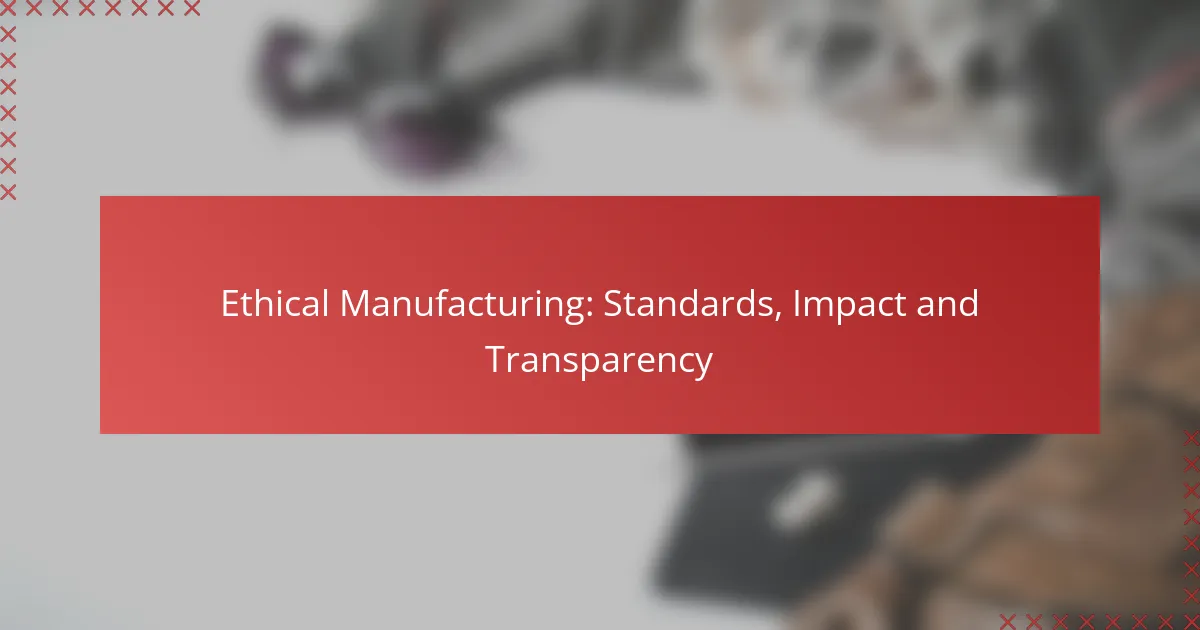Ethical manufacturing encompasses standards that prioritize fair labor practices, environmental sustainability, and social accountability. As consumers increasingly demand transparency and responsibility from brands, companies that adopt these practices not only enhance their reputation but also foster brand loyalty and attract a conscientious customer base.
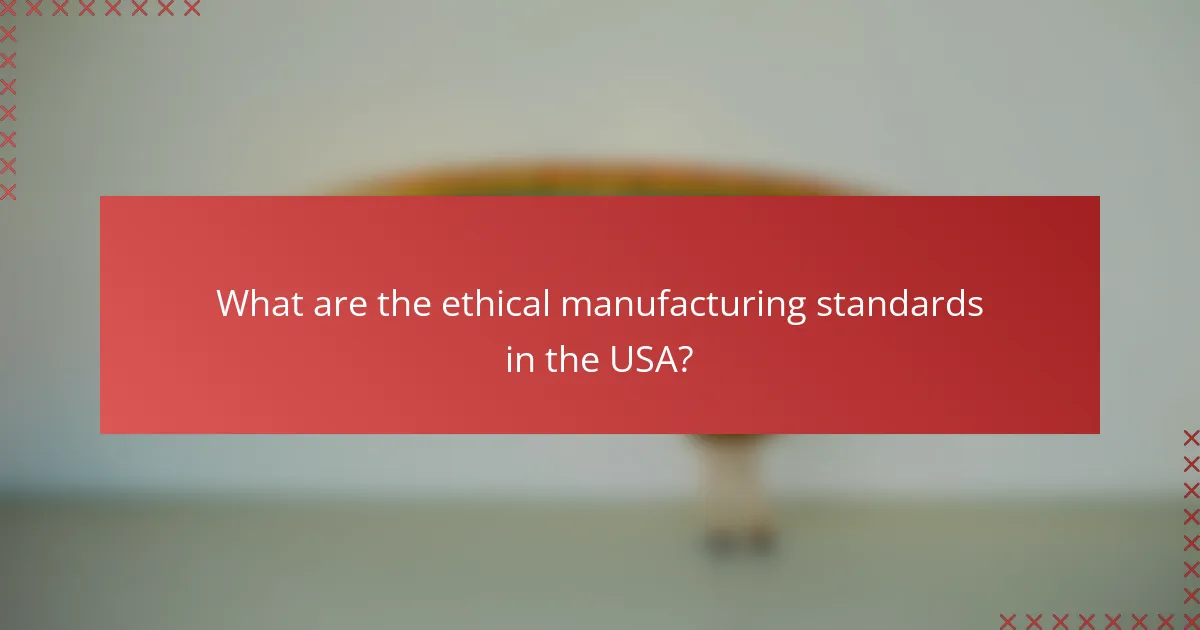
What are the ethical manufacturing standards in the USA?
Ethical manufacturing standards in the USA focus on ensuring fair labor practices, environmental responsibility, and social accountability. These standards help companies demonstrate their commitment to ethical practices while meeting consumer demand for transparency and sustainability.
Fair Trade Certification
Fair Trade Certification ensures that products are made under fair labor conditions, promoting equitable trade practices. This certification typically requires that producers receive fair wages, work in safe conditions, and engage in environmentally sustainable practices.
In the USA, products like coffee, chocolate, and textiles often carry Fair Trade Certification. Consumers can look for the Fair Trade logo to identify these products, which often have a slightly higher price point due to the ethical practices involved.
ISO 14001 Environmental Management
ISO 14001 is an international standard that outlines how organizations can manage their environmental responsibilities effectively. Companies that adopt this standard commit to minimizing their environmental impact through systematic processes and continuous improvement.
In practical terms, businesses may implement waste reduction strategies, energy efficiency programs, and pollution prevention measures. Achieving ISO 14001 certification can enhance a company’s reputation and appeal to environmentally conscious consumers.
SA8000 Social Accountability
SA8000 is a global standard for improving working conditions and ensuring social accountability in the workplace. It focuses on areas such as child labor, forced labor, health and safety, and workers’ rights.
Companies seeking SA8000 certification must undergo rigorous audits to verify compliance with its criteria. This certification can help businesses attract socially responsible consumers and improve employee morale by fostering a positive work environment.
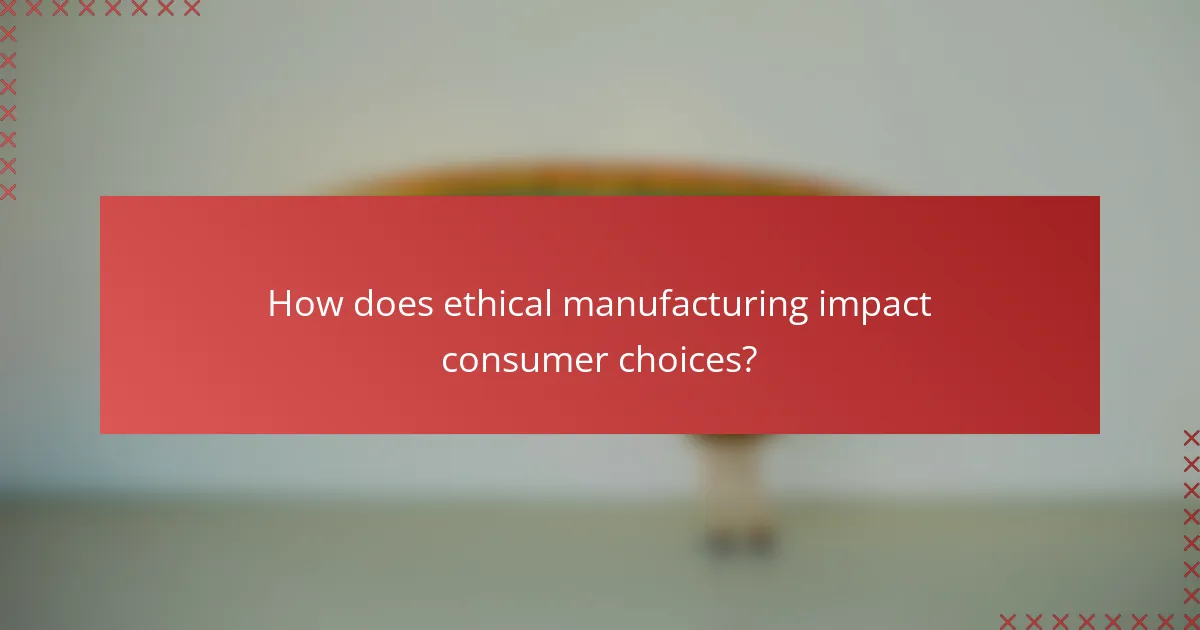
How does ethical manufacturing impact consumer choices?
Ethical manufacturing significantly influences consumer choices by fostering a sense of responsibility and accountability among brands. Consumers increasingly prefer products that align with their values, leading to a shift towards companies that prioritize ethical practices.
Increased consumer trust
When brands commit to ethical manufacturing, they build stronger trust with their customers. Transparency in sourcing, labor practices, and environmental impact reassures consumers that their purchases support fair treatment and sustainability.
For instance, companies that openly share their supply chain processes and certifications, such as Fair Trade or Global Organic Textile Standard (GOTS), often see higher customer loyalty. This trust can translate into repeat purchases and positive word-of-mouth, enhancing brand reputation.
Preference for sustainable brands
Consumers are increasingly favoring sustainable brands that demonstrate a commitment to ethical manufacturing. This preference is driven by a growing awareness of environmental issues and social justice, prompting buyers to seek out products that minimize harm.
Brands that utilize eco-friendly materials, reduce waste, and invest in fair labor practices often attract a dedicated customer base. For example, companies that produce clothing from organic cotton or recycled materials are more likely to resonate with environmentally conscious shoppers, leading to increased sales and market share.

What are the benefits of ethical manufacturing for businesses?
Ethical manufacturing offers several advantages for businesses, including improved brand loyalty and increased market opportunities. By prioritizing ethical practices, companies can enhance their reputation and appeal to conscious consumers who value sustainability and social responsibility.
Enhanced brand reputation
Adopting ethical manufacturing practices significantly boosts a company’s brand reputation. Consumers today are more informed and prefer brands that demonstrate commitment to ethical standards, such as fair labor practices and environmentally friendly processes. A strong reputation can lead to increased customer loyalty and positive word-of-mouth marketing.
To enhance brand reputation, businesses should transparently communicate their ethical practices through marketing channels. Highlighting certifications, such as Fair Trade or ISO 14001, can further validate a company’s commitment to ethical manufacturing.
Access to new markets
Ethical manufacturing opens doors to new markets, particularly among consumers who prioritize sustainability. Many regions, especially in Europe and North America, have a growing demand for ethically produced goods, creating opportunities for businesses that align with these values.
To tap into these markets, companies should research local regulations and consumer preferences regarding ethical standards. Participating in trade shows focused on sustainable products or joining ethical business networks can also facilitate connections with potential customers and partners.

How can companies ensure transparency in their supply chains?
Companies can ensure transparency in their supply chains by implementing technologies and practices that provide clear visibility into sourcing and production processes. This involves utilizing advanced tracking systems and engaging independent evaluators to verify compliance with ethical standards.
Blockchain technology
Blockchain technology offers a decentralized and immutable ledger that can track products from their origin to the final consumer. By recording every transaction related to a product, companies can provide verifiable proof of ethical sourcing and production practices.
Implementing blockchain can enhance trust with consumers and stakeholders, as it allows for real-time access to supply chain data. However, companies should consider the costs and technical expertise required to establish and maintain such systems.
Third-party audits
Third-party audits involve independent organizations assessing a company’s supply chain practices to ensure compliance with ethical standards. These audits can identify areas for improvement and validate claims made by companies regarding their sourcing and manufacturing processes.
Regular audits can help companies maintain accountability and transparency, but it is crucial to select reputable auditing firms. Companies should also be prepared for potential findings that may require changes in their supply chain practices to meet ethical standards.
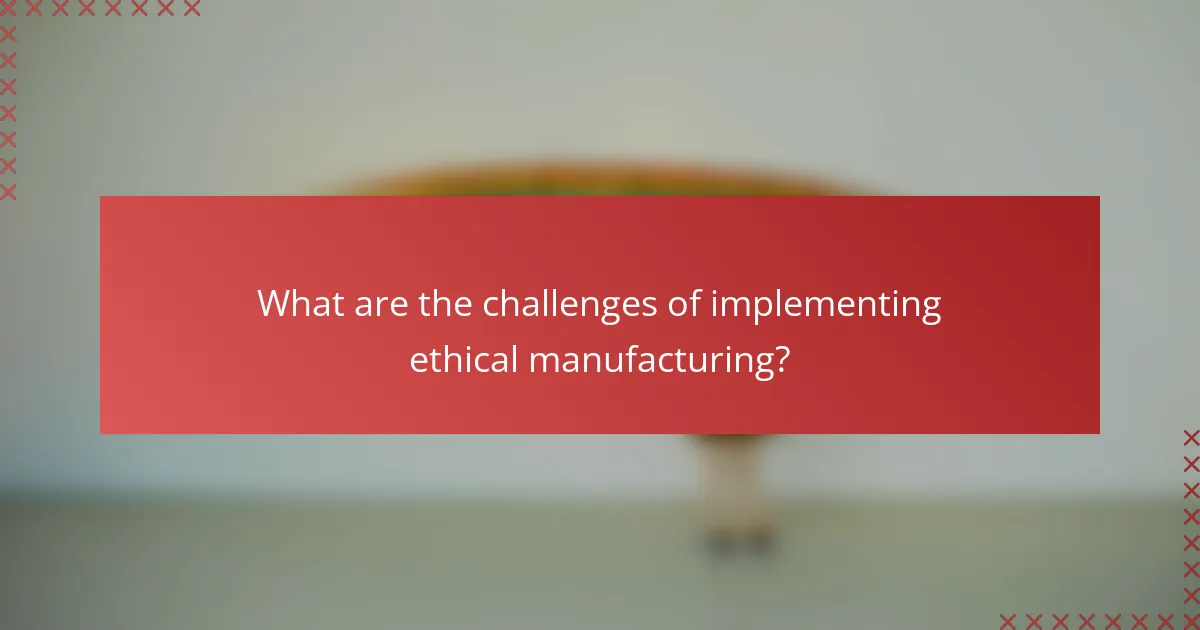
What are the challenges of implementing ethical manufacturing?
Implementing ethical manufacturing presents several challenges, including increased costs and the complexity of managing supply chains. Companies must navigate these obstacles while striving to maintain profitability and transparency.
Higher production costs
One of the primary challenges of ethical manufacturing is the higher production costs associated with sustainable practices. Companies often face increased expenses due to sourcing materials from certified suppliers, adhering to fair labor practices, and implementing environmentally friendly processes.
For instance, using organic or recycled materials can lead to a price premium, which may range from 10% to 30% higher than conventional options. Businesses must weigh these costs against potential benefits, such as enhanced brand loyalty and market differentiation.
Complex supply chain management
Managing a supply chain that adheres to ethical manufacturing standards can be intricate and demanding. Companies need to ensure that every supplier and partner aligns with their ethical values, which often requires extensive vetting and ongoing monitoring.
This complexity can lead to challenges in transparency and traceability, as businesses must track materials from origin to final product. Utilizing technology, such as blockchain, can help improve visibility, but it may also require significant investment and training.
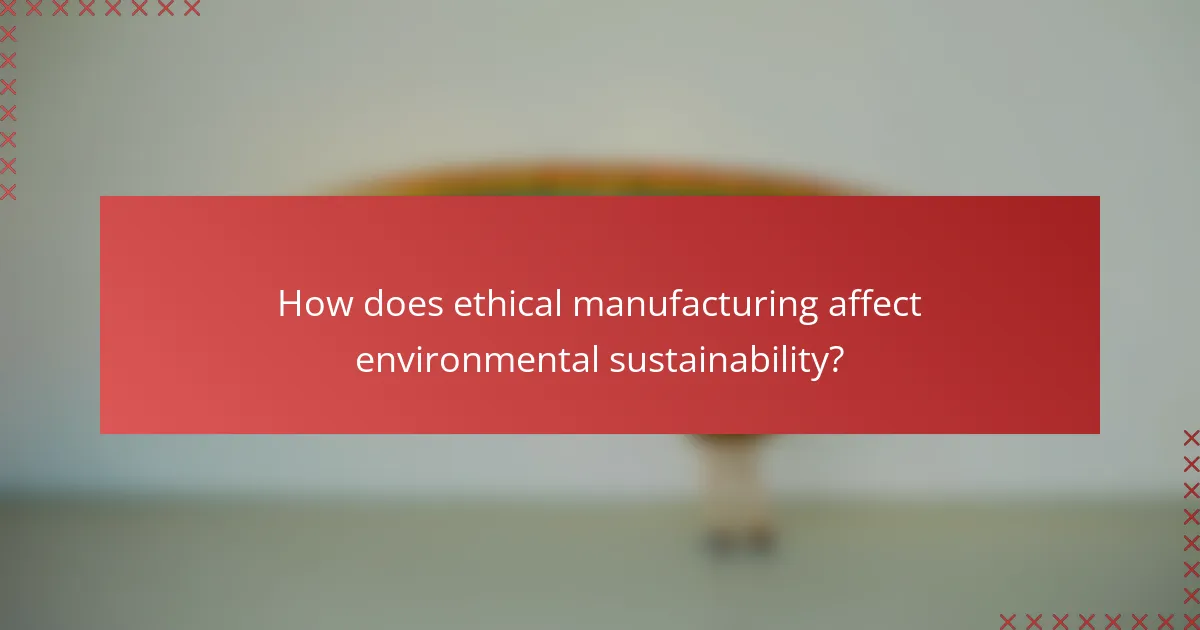
How does ethical manufacturing affect environmental sustainability?
Ethical manufacturing significantly enhances environmental sustainability by prioritizing practices that minimize harm to the planet. This approach focuses on reducing waste, conserving resources, and lowering emissions throughout the production process.
Reduction of carbon footprint
Reducing the carbon footprint is a core principle of ethical manufacturing. This involves implementing energy-efficient technologies, utilizing renewable energy sources, and optimizing transportation logistics to decrease greenhouse gas emissions. For example, companies may switch to solar or wind power, which can cut emissions by a substantial margin.
Additionally, manufacturers can adopt practices like local sourcing of materials to minimize transportation distances, further lowering their carbon output. Regular audits and assessments can help identify areas for improvement and track progress towards carbon reduction goals.
Conservation of resources
Conserving resources is another key aspect of ethical manufacturing. This includes reducing water usage, minimizing raw material consumption, and recycling waste products. Companies can adopt closed-loop systems that reuse materials, which not only conserves resources but also reduces costs over time.
For instance, manufacturers can implement water-efficient technologies that recycle wastewater, significantly lowering overall water consumption. Additionally, using sustainable materials, such as organic cotton or recycled plastics, helps preserve natural resources while meeting consumer demand for eco-friendly products.
